Saturday, December 7. 2013
Xi'an, capsule hostel, chinese pyramids and more
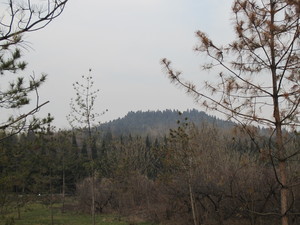
The great pyramid of China (I admin it doesn't look that spectacular and pyramid-like)
Between Dunhuang and Lanzhou, I took what is called the "hard seat" class for a 14 hour ride (not overnight). I can quote Wikivoyage on that:
"Traveling in a seat (hard or soft-class) means you will share the car space with lots of locals. You will most likely encounter smokers, loud noise, and constant activity in the aisle while you try to sleep. *Do not* travel hard class if you are uncomfortable with these settings."
While I certainly was an interesting experience, it is not exactly one I'd like to repeat. It was challenging and I was quite happy when I finally arrived.
With my arrival in Xi'an, finally I noticed that I approach the warmer zones of China. While not really "summer-warm", I apprechiated not having to wear winter clothes all the time. Appart from that, Xi'an was quite different from the other cities I've visited before. It is in many small ways much more like a western city (and, to be not mistaken, in many ways this is a good thing - better hygiene, less dangerous traffic, no smoking in non-smoking zones). And regarding my last blog post, yes, coffee is usually available, although often expensive.
Xi'an is also home of one of Chinas most popular tourist attractions, the so-called terracotta warriors and - not that well known - the Chinese pyramids. I didn't know that there are pyramids in China, so found that worth seeing. Unlike pyramids in other places of the world, the chinese pyramids are not buildings, they are artificial hills. The biggest one, near the terracotta warriors, is the mausoleum of Chinas first emperor Qin Shi Huang.
My initial plan was to visit the pyramid and then decide if I still had time and motivation to see the terracotta warriors. I took the bus to the terracotta warriors and walked the roughly two kilometers to the pyramid. Turned out my planning was not really how one was supposed to do things. Going to the pyramid is only possible with an entrance ticket for the terracotta warrior museum - and you cannot buy it at the entrance of the pyramid area. There's a free shuttle service which I then took to get the ticket and drive back.
The pyramid doesn't look that spectacular and there's hardly a spot where you can actually see it's a pyramid. It once was much bigger, but during the centuries, the earth got compressed and it became smaller. I walked around a lot, the area around is a nice park.
As it is common amongst tourist destinations probably everywhere in the world, there is a huge amount of people who want to sell you things - from terracotta warrior replica in all sizes (including ones in original size and made mostly out of the same materials than the original ones) to the various tour guides. I refused all these offers and preferred to find my own way. One more thing notable: This isn't mainly a tourist spot for foreign tourist. The vast majority were domestic tourists.
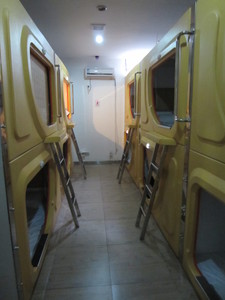
Capsule Hotel in Xi'an
While writing this, I'm in the highspeed train from Xi'an to Guangzhou (taking only 8 hours). I've been to Guangzhou before, and I'm not going there not mainly because I want to see something there. I have a double-entry 2 x 30 days visa and from Guangzhou, I intend to make a quick hop to Hong Kong. Although part of China, in visa issues Hong Kong is like going to another country. So by going to Hong Kong, I have another 30 days to spend in China. Arriving in Guangzhou, I can also finally leave any traces of the northern hemisphere winter behind myself. It has comfortable temperatures all year round.
Pictures from Xian
Pictures from Guangzhou
Posted by Hanno Böck
in English, Life
at
04:06
| Comments (0)
| Trackbacks (0)
Defined tags for this entry: asia, asia2013, capsulehotel, china, pyramid, terracottawarriors, train, xian
Monday, December 2. 2013
No coffee in northwest China
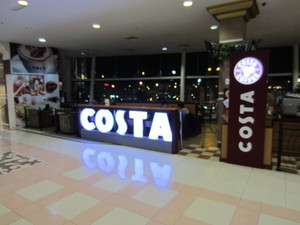
Costa Coffee is expanding to Asia - this one's in Astana
When travelling, I usually have my own coffee making equipment, which consists of a couple of coffee filters, a collapsable filter holder, some coffee powder and some coffee creamer powder (which doesn't make a very delicious coffee and I prefer real milk or soy milk if possible, but it's a reasonable compromise when travelling).
I was running out of coffee powder shortly after I entered China. I really hadn't expected that it would be a problem. After all, the biggest international coffee chains, Starbucks and Costa Coffee, are flooding eastern and southern China with their restaurants and Chinese chains and independent coffee houses are trying to keep up with that. Well, the problem is that I entered China in the far northwest. And the Chinese love for coffee hasn't made it there yet.
I could hardly believe this, but between Yining and Dunhuang, I didn't find any coffee. None at all. Not in the form of coffee powder and not in brewed form. Yeah, supermarkets have a large collection of soluble instant coffee, most of it Nescafe and also some Chinese brands. But I refuse to call that stuff coffee. Most of it contains more sugar than anything else. When you get coffee in restaurants at all, you can bet it's also instant coffee. I checked where the next Starbucks is: In Xi'an, thousands of kilometers away. I checked for the next Costa Coffee: Also in Xi'an. (I'm on my way to Xi'an now - no, not just because of the coffee, it was my plan anyway.)
After all, I bought some non-sugared instant coffee. No, I wasn't happy with it, but it seemed it was the best I could get.
Lesson learned: There's just no coffee in northwest China.
Saturday, November 30. 2013
Through Western China and no train tickets from Urumqi
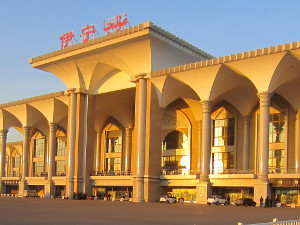
Train station in Yining
I took the train from Yining to Urumqi. My original plan was to move along quite fast and directly take the next train to Xi'an. But that didn't really work. I had to find out that all train tickets for the upcoming days to every location east of Urumqi were sold out. This was kind of a déjà vu. Last time I was in China I had the plan to travel this way in the other direction - and no tickets were available. Reading local news, this situation might improve 2014, when a new highspeed train line opens between Urumqi and Lanzhou. I didn't want to wait that long though.
However, this time I knew that there are alternatives - by taking the bus. I took a bus to the town Dunhuang, which is about 1,000 kilometers east of Urumqi.
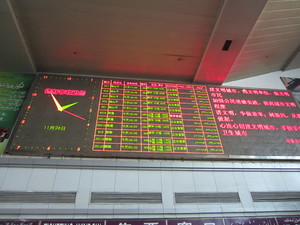
Bus times in Urumqi
The bus trip through the Xinjiang desert passed a lot of wind turbines. While China is often portrayed as the environmental bad guy, one shouldn't fail to recognize that it's also the world leader in building renewable energies. However, the many Xinjiang wind turbine fields also told the other not so green side of the Chinese renewable boom: Many of the turbines were just standing still. The most likely reason: China is building up wind power faster than it's caring for grid integration. I'm used to that look in Germany - wind power there is also often downregulated, because grid integration is not keeping up with the installation of new wind energy. But it was quite obvious that this problem is far bigger here in China's desert.
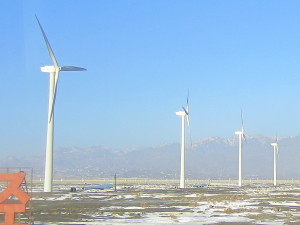
Wind energy in Xinjiang
Tomorrow I'll take the train to Lanzhou.
Pictures from Yining
Pictures from Dunhuang
Pictures from wind power turbines in the Xinjiang province
Pictures from Lanzhou
Tuesday, November 26. 2013
By Bus from Almaty/Kazakhstan to Yining/China
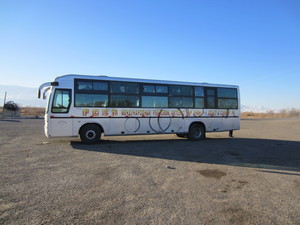
Our bus
I read at some places about a different possibility: A bus service from Almaty to Yining (伊宁 which, to make things complicated, has also a kazakh/uighur name - Kulja / Құлжа / قۇلجا - which, to make things even more complicated, can be written in many different ways using latin characters, cyrillic characters or arabic characters). The information was quite scarce. I basically only had a few forum entries mentioning it, so all the information I had seemed quite unreliable. And even the guy from the hostel where I stayed didn't know more.
I could find out that there's an international bus station in Almaty called Sayran (сайран). It is located somewhat outside the city and can be reached with bus number 100 from the Almaty 2 train station. I went there on Thursday and - although without language communication possible - could tell them what I wanted. They wrote me down a date and time for the next bus: Saturday at seven in the morning. Sadly, I didn't find out how often this bus goes. Saturday was fine for me so I bought my ticket for the bus.
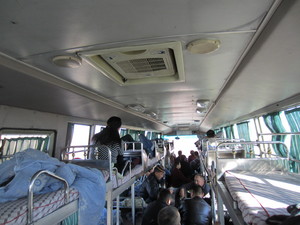
Beds and most people sitting on the floor
We spend about an hour at a restaurant in the middle of the desert and also some time at the border. I was a bit worried about the border crossing, because recently there have been some conflicts in the Xinjiang province, which is the chinese province you enter when coming from Kazakhstan. But at the border everything was fine, except that my border crossing took a bit longer than the others.
Right behind the border a lot of people were trying to offer money exchange. I didn't do that, because at such points you usually don't get the best exchange rates, which later turned out to be a mistake. It seems not exactly easy to change Tenge into Renminbi in Yining and as I'm writing this, I still have some Kazakh money with me after having tried to exchange it in three different banks in Yining.
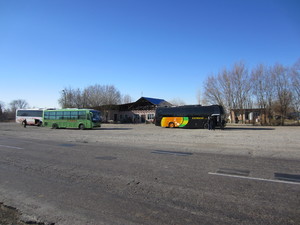
Lunch break in the desert - this really felt like being in the middle of nowhere
Hopefully this information will provide other travellers some help when they try to take this bus. To recap the important information:
- Bus from Almaty to Yining starts at Sayran bus station (reachable via local bus 100 from Almaty 2 train station).
- Runs at 07:00 a.m. on unknown weekdays, but due to my experiences probably on fridays and not on thursdays (If you have any info on that, e. g. a link to the bus company, please add it in the comments).
- Costs 4600 Tenge (thats about 21 € or 30 US$).
- Takes about 12 hours.
- Crosses border to China at Khorgas (霍尔果斯 in mandarin chinese, قورعاس in uighur, Хоргос in russian and Қорғас in kazakh language).
Pictures from bus trip
Saturday, November 23. 2013
Almaty and the little Alps
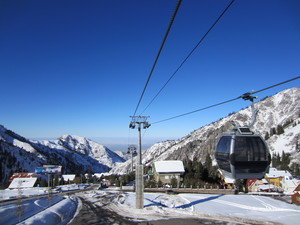 After Astana I went on to Almaty, which is the former capital of Kazakhstan. As I already wrote my previous two stops (Petropavl and Astana) were sharp contrasts, Almaty again was a completely different place. While also relatively expensive, it doesn't have the kind of "artificial" feeling that is present in Astana.
After Astana I went on to Almaty, which is the former capital of Kazakhstan. As I already wrote my previous two stops (Petropavl and Astana) were sharp contrasts, Almaty again was a completely different place. While also relatively expensive, it doesn't have the kind of "artificial" feeling that is present in Astana.I spend two days here. Almaty has some mountains surrounding it. There are two hilltops that one can reach via cable car. One is Koktobe, which has something like a small amusement park on the top. But due to lots of snow, most things there were closed. For the free software fans upon my readers: I saw an arcade machine with Tuxracer there. Never seen Tuxracer in an arcade machien before (however, I have seen an arcade machine with the free software game Stepmania on my last trip).
The other cable car starts near the ice skating stadium Medeo (which can be reached via public bus line 6) and goes to the ski ressort Shymbulak. The ski resort was closed and sadly, this meant that also the second cable car, which could bring one even more up the hills, was also closed. Still I had some stunning views on the mountains. In the gondola, I talked to a local who spoke a bit of English. He said they call it the "little Alps". I found that quite described it well. It really looked like you were in Austria or Switzerland. To make this impression complete, the cable car was even built in Switzerland.
Pictures from Almaty
Friday, November 22. 2013
Astana - the Dubai of Kazakhstan
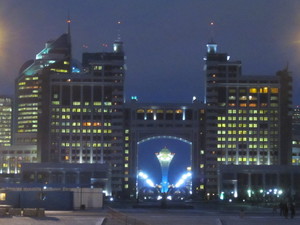
Baiterek from the West ...
I am glad that I've been both in an I assume average Kazakh city like Petropavl and the capital Astana. The contrast was pretty extreme. It wasn't like going to another city in the same country, it felt more like going to another world. Petropavl looked more or less like many post-soviet cities I've been before. Often a bit shabby, with waste laying around, broken or non-existent sidewalks and alike.
Astana is quite the opposite. Nothing here is old, large parts of Astana were build within the last two decades. Dirt or waste in the streets was almost zero and the traffic seems pretty civilized. Until 1997, Almaty was the capital of Kazakhstan, due to some complicated political compromises, it was moved to Astana and there began the growth of this boom town.
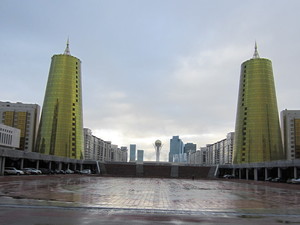
... and from the East
One thing that's notably missing in Astana: It has only a very limited public transport system. There's no metro, no tram and no trolleybusses. Normal busses are the only way to get around. In the evening, they are so crowded that it can be a pain to use them. Also, it's a bit tricky to find out which busses you want to take. Bus stations have sometimes maps with bus lines, but they don't show all bus lines, only the ones starting at exactly that bus stop. I didn't see any complete bus map anywhere offilne or online. I've pictured a bus map (and another one) which features some of the more important lines linking the city center with the train station, maybe this is of some help for other travellers.
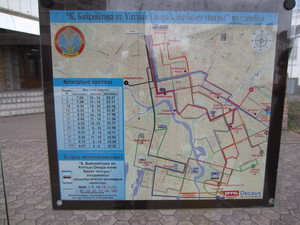
Astana Bus map
I originally planned to stay until saturday and take the train to China from Astana, but I found that the options of exploring the city were quite limited. You pretty quickly get around having seen all of its sights and there doesn't seem much around worth visiting. So I went on to Almaty.
A quick overview of things one can do and i did in Astana:
- Go on Baiterek tower: Not too expensive and nice view on the city with signs of distances to other relevant cities (e. g. Beijing 3656 km, Moscow 2280 km, Helsinki 3020 km).
- Ocenarium in the Duman entertainment center: Not that cheap, but nice and quite relaxing atmosphere. Biggest attraction are two large tunnels under a big aquarium, so you can watch the fishes from below.
- Pyramid (Palace of Peace and Reconciliation): Pyramid formed building containing an opera, conference centers and more. Not really worth visiting, it was mostly boring. I was the only english speaking person at that time, which didn't stop them from giving me a guided tour through the building.
- Khan Shatyry: Mostly a shopping center (so not thatwah interesting, except for the fact that it's a tent-like architecture). The upper floor contains a mix of an amusement park and an arcade hall. I saw a lot of those entertainment complexes, most other shopping centers in Astana have something alike. Also, there's a "Beach Club", which is a very expensive swimming bath.
- Watch unusual architecture: All over the city center.
Pictures from Astana
Posted by Hanno Böck
in English, Life
at
13:36
| Comments (0)
| Trackbacks (0)
Defined tags for this entry: architecture, asia2013, astana, baiterek, kazakhstan, khanshatyry, petropavl, travel
Thursday, November 21. 2013
Visa Registration in Kazakhstan
When I crossed the border to Kazakhstan I was told that I had to register my visa within 5 days. I read about that before, but I thought I had read somewhere that this wasn't necessary for EU citizens, so I was a bit surprised. But it turned out registration wasn't that difficult.
I did the registration on Monday in Astana. Registration needs to be done at the Migration Police office, which is located in the улица Сакена Сейфулина 29. I was there at 11:00 and the place was quite crowded and busy, so I already feared this might take some time. But it only took a couple of minutes, I gave them my passport, my migration card and a business card of my hotel (they wanted to know the adress). Then I was told to come back at 15:00. I was also told that they could only do a registration for a maximum of ten days. This wasn't a problem for me, because I don't intend to stay longer in Kazakhstan and my Visa validity ends there anyway. But for travellers wanting to stay longer in Kazakhstan this might be a cause of trouble.
After all, it wasn't that troublesome, but you should be aware of the registration when travelling to Kazakhstan. I don't know what to do if you're not passing a big city and thus have no way to visit the office of the migration police.
I did the registration on Monday in Astana. Registration needs to be done at the Migration Police office, which is located in the улица Сакена Сейфулина 29. I was there at 11:00 and the place was quite crowded and busy, so I already feared this might take some time. But it only took a couple of minutes, I gave them my passport, my migration card and a business card of my hotel (they wanted to know the adress). Then I was told to come back at 15:00. I was also told that they could only do a registration for a maximum of ten days. This wasn't a problem for me, because I don't intend to stay longer in Kazakhstan and my Visa validity ends there anyway. But for travellers wanting to stay longer in Kazakhstan this might be a cause of trouble.
After all, it wasn't that troublesome, but you should be aware of the registration when travelling to Kazakhstan. I don't know what to do if you're not passing a big city and thus have no way to visit the office of the migration police.
Sunday, November 17. 2013
Petropavl in northern Kazakhstan
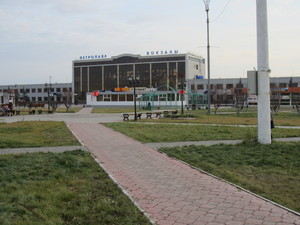 After a two-night train trip I arrived in Kazakhstan in the town Petropavl / Петропавл, also known under the name Petropavlovsk (which should not be confused with Petropavlovsk in Russia, where a town with the same name exists). There was no particular reason why I went there except that there's a relatively fast train from Moscow. Going directly from Moscow to Kazakhstan's capital Astana or the ex-capital Almaty would've meant a trip with at least three nights in a train, which I thought would be too much.
After a two-night train trip I arrived in Kazakhstan in the town Petropavl / Петропавл, also known under the name Petropavlovsk (which should not be confused with Petropavlovsk in Russia, where a town with the same name exists). There was no particular reason why I went there except that there's a relatively fast train from Moscow. Going directly from Moscow to Kazakhstan's capital Astana or the ex-capital Almaty would've meant a trip with at least three nights in a train, which I thought would be too much.There's surprisingly little information you find online about Petropavl in English, although it's not that small (about 200.000 inhabitants). I can't add that much, as I only stayed for one night.
I had a booking for a hotel, which teached me a little lesson: Sometimes preparing to much may cause more hassle than it helps. I didn't find the hotel I've booked at the address where it was supposed to be. You may wonder how I fail to find a hotel, but you need to know that "hotel" here not necessarily means the same as you are used to be (big building with big sign "Hotel XY"). They're often hidden in flats inside normal buildings.
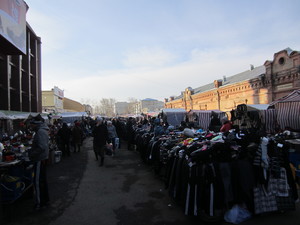 After checking the booking again I found out that it listed two addresses. One for the apartment and one as the contact address - and they were not nearby. No hint where I was supposed to go. While searching for my hotel, I found three other hotels which, by the way, were all much cheaper than everything that was bookable online. So finally I decided to forget my booking and just took one that seemed okay. Luckily, I could cancel my other booking without costs (I would've complained if I hadn't been able to do so) and ended up in a fine apartment, cheaper than planned and with a kitchen.
After checking the booking again I found out that it listed two addresses. One for the apartment and one as the contact address - and they were not nearby. No hint where I was supposed to go. While searching for my hotel, I found three other hotels which, by the way, were all much cheaper than everything that was bookable online. So finally I decided to forget my booking and just took one that seemed okay. Luckily, I could cancel my other booking without costs (I would've complained if I hadn't been able to do so) and ended up in a fine apartment, cheaper than planned and with a kitchen.Notable in Petropavl was a huge outdoor market. Although it's quite cold, it was crowded and seemed to be the normal way of shopping here. Not only food was sold, but anything from clothes to tools or car parts.
After spending a night, I took the train to the capital Astana.
Pictures Train Moscow-Petropavl
Pictures from Petropavl
Friday, November 15. 2013
Moscow and the Museum of Soviet Arcade Machines
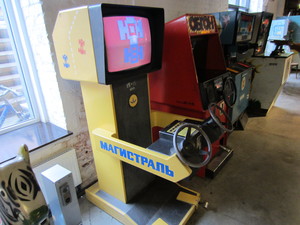 I had about six hours time in Moscow before entering my next train. A bit too much time for getting from one train station to another, eating and sitting around. So I looked for something to do while being in Moscow. I already visited the basic sights like the Red Square last time I was in Moscow, so I was looking for something more unusual.
I had about six hours time in Moscow before entering my next train. A bit too much time for getting from one train station to another, eating and sitting around. So I looked for something to do while being in Moscow. I already visited the basic sights like the Red Square last time I was in Moscow, so I was looking for something more unusual.I checked the Wikivoyage page of Moscow and one of the first things it mentions is the Museum of Soviet Arcade Machines. That sounded like it's worth a visit. I checked the location and it is quite centrally located, only a few minutes walk from the Metro station Baumanskaya. (If you exit the metro, you're already on Baumanskaya street and the Museum is in Baumanskaya street 11.)
As the name says, the museum features arcade machines from the soviet aera. You get a couple of real soviet 15 Kopek coins when entering that you can spend on playing. So I played some rounds of Magistral (Магистраль) - seems something like the soviet answer to Pacman - and others. Honestly, for many of the games I failed to understand how they were supposed to be played. What was interesting that there were a couple of "games" that featured non-virtual content. For example, there was a game where you could control a little toy tank called Tankodrom (танкодром), but I didn't really understand how to play that game either. Obviously there were quite a number of games with cold war references. The Museum also includes some tables where you can have a coffee after playing. If you ever happen to be in Saint-Petersburg, the museum has a branch there, too.
After that I went to Kazansky railway station where my next train was leaving. Moscow has several train stations and some of them are named after the countries where their international trains are heading. So for me that meant I entered Moscow at the Belorussky railway station (because I came through Belarus) and I left at Kazansky railway station (because I was heading to Kazakhstan). (someone in the comments told me this is wrong and Kazaksny station refers to the city Kazan - so I was probably wrong on this naming)
Pictures from the Museum of Soviet Arcade Machines in Moscow
Posted by Hanno Böck
in Computer culture, English, Life, Retro Games
at
16:45
| Comment (1)
| Trackbacks (0)
Defined tags for this entry: arcade, asia2013, computerhistory, magistral, moscow, museum, retro, retrogames, russia, tankodrom
Entering Russia and the migration card
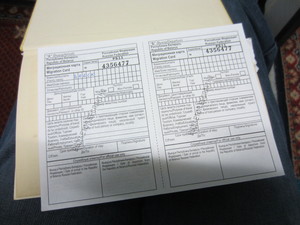
Russian migration card
The migration card is a double-form where you have to fill in some of your basic data. It's then stamped by the border guards and split in half. They keep one half, you get the other and keep it until you leave the country again. From what I've heard, one of the more troublesome things you can encounter is losing your migration card while in Russia.
There are some tricky things to know about the migration card. First: If you enter Russia through Belarus, you'll get only one migration card for both countries. That bothered me a lot on my last trip, because I only entered the data for Belarus, that means a stay of one day. Turned out this wasn't a big issue. When leaving Russia the border guards had a more closer look on the documents and obviously noticed the misinformation, but they didn't seem to care that much.
There seem to be similar issues with other countries. I even once got a migration card at the Ukrainian border, where I didn't want to enter Russia at all. It just happened that I was sitting in a train that was going to Russia after crossing the Ukraine. So if you ever happen to enter Russia through another country, although you don't necessarily get the migration card at the Russian border, you should enter the data for your stay in Russia.
Another thing I learned this time: There is a field for the Visa number. Now I obviously had two Visa - one for Belarus and one for Russia. I filed the number of the Russian one, because after all, I wanted to go to Russia and only cross Belarus on a train. Turned out I was wrong and the Belarus border guards complained. Admittedly, it can be a bit frightening if a border guard tells you something is wrong, especially if you don't understand their language. But after all, he just filled in the correct Visa number himself and everything was okay.
Kazakhstan also has a migration card, but it is not split in half and no similar pitfalls seem to occur there.
Tuesday, November 12. 2013
Travelling again
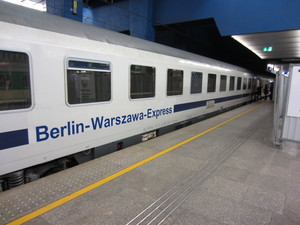 If you've been reading my blog back in 2011, you'll remember that I did a two-month-long trip on the transsiberian railway through Russia, Mongolia and China. Ever since the idea was in my head that I wanted to do something alike again.
If you've been reading my blog back in 2011, you'll remember that I did a two-month-long trip on the transsiberian railway through Russia, Mongolia and China. Ever since the idea was in my head that I wanted to do something alike again.So today I am starting a new journey to Asia, again mostly by train. Slightly modified from last time, as I don't need to see all the places again I've already been. I started today at 6 am in Berlin and I'm currently in Warsaw, Poland (where the 19th world climate conference is just starting, but that's purely a coincidence). I'll only spend a couple of hours in Warsaw and then will continue my trip to Moscow. From there, I'll head on to Kazakhstan and later to China. If everything works out as intended, I'll hopefully spend parts of the winter in warm and sunny areas.
I make no promises, but I'll try to keep my blog updated with pictures and events happening on my trip.
Technical note: All entries related to this trip will be marked with the tag asia2013. All entries related to my previous trip to asia can be found under the tag trip2011. Pictures will be collected here.
Sunday, October 20. 2013
Strange places - the Crooked Forest
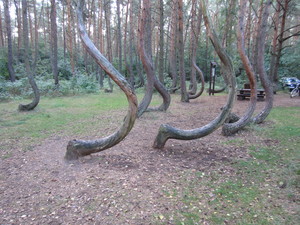 Some time ago I stumbled upon this webpage, which lists a couple of extraordinary travel destinations.
Some time ago I stumbled upon this webpage, which lists a couple of extraordinary travel destinations.One of them catched my attention: The so-called "Crooked Forest" near Gryfino in Poland. Now, it certainly isn't the most spectacular on that list. But it has one special feature which makes it interesting for me: From where I live (Berlin) it's not very far. So recently I went there by train and bike and had a look.
The Crooked Forest are a couple of pines that grow in really weird shapes, as you can see in the picture on the right. It is not entirely certain what the reason for those weird-looking trees is. Wikipedia has some information, which - interestingly - is different in the english and german article about it.
Some more pictures of the Crooked Forest
Thursday, September 19. 2013
Improved SSD performance on old Thinkpads with BIOS mod
Recently, my old harddisk produced some errors. As I care for my data, I immediately replaced it and decided to invest in an SSD.
My laptop (Lenovo Thinkpad T61) is already some years old, so I'm quite aware that I won't get the best possible performance out of it. But I found something really interesting. The BIOS seems to limit the SATA II speed and there's an unofficial BIOS mod to remove that limitation. It's also available for a couple of other Thinkpad models (beside T61 also for R61, X61, X300 and variants of them).
The BIOS mod also does a number of other things, for example the official BIOS has a whitelist of allowed wireless chips. That gets removed.
The full feature list from the readme file:
- Disabled whitelist check.
- Enabled SATA II full speed.
- Added SLIC 2.1 table.
- Removed "Thermal sensing error" boot message (Penryn CPUs).
- Added dual-IDA support.
Obivous Warning: You're doing this at your own risk. If any unofficial BIOS destroys your laptop or your data, that's bad luck. The only thing I can tell is that I didn't experience any problems and that so far, a lot of people seem to use these BIOS mods without problems.
Now I did some before-after-benchmarking. I used hdparm -tT /dev/sda and a simple dd if=/dev/zero of=/tmp/out.img bs=8k count=256k. I started the benchmark after a fresh boot without anything else running to avoid disturbances. I ran the tests a couple of times and will only give you the last result of each tests, but they didn't differ much. The results:
Quite impressive, isn't it? I just doubled the speed of my disk for free. I'm aware that benchmarking is a tricky business and the impact this has on my overall system performance is probably difficult to put in numbers, but the results are significant enough that I think it was worth it.
Slightly related: There's also a modified firmware for the Optiarc AD7910A CD/DVD burner that's shipped in my laptop.
My laptop (Lenovo Thinkpad T61) is already some years old, so I'm quite aware that I won't get the best possible performance out of it. But I found something really interesting. The BIOS seems to limit the SATA II speed and there's an unofficial BIOS mod to remove that limitation. It's also available for a couple of other Thinkpad models (beside T61 also for R61, X61, X300 and variants of them).
The BIOS mod also does a number of other things, for example the official BIOS has a whitelist of allowed wireless chips. That gets removed.
The full feature list from the readme file:
- Disabled whitelist check.
- Enabled SATA II full speed.
- Added SLIC 2.1 table.
- Removed "Thermal sensing error" boot message (Penryn CPUs).
- Added dual-IDA support.
Obivous Warning: You're doing this at your own risk. If any unofficial BIOS destroys your laptop or your data, that's bad luck. The only thing I can tell is that I didn't experience any problems and that so far, a lot of people seem to use these BIOS mods without problems.
Now I did some before-after-benchmarking. I used hdparm -tT /dev/sda and a simple dd if=/dev/zero of=/tmp/out.img bs=8k count=256k. I started the benchmark after a fresh boot without anything else running to avoid disturbances. I ran the tests a couple of times and will only give you the last result of each tests, but they didn't differ much. The results:
| before | after | |
| hdparm cached read | 3069.01 MB/s | 6900.56 MB/s |
| hdparm buffered read | 131.38 MB/s | 251.79 MB/s |
| dd write | 106 MB/s | 209 MB/s |
Quite impressive, isn't it? I just doubled the speed of my disk for free. I'm aware that benchmarking is a tricky business and the impact this has on my overall system performance is probably difficult to put in numbers, but the results are significant enough that I think it was worth it.
Slightly related: There's also a modified firmware for the Optiarc AD7910A CD/DVD burner that's shipped in my laptop.
Wednesday, September 4. 2013
My AC100 travel laptop
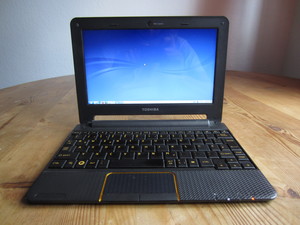 I recently noted that I have never blogged about this nice little device I now own for a couple of years. I originally bought the Toshiba AC100 before a two-month-long trip through Russia and China.
I recently noted that I have never blogged about this nice little device I now own for a couple of years. I originally bought the Toshiba AC100 before a two-month-long trip through Russia and China.I was looking for a possibility to have a basic laptop, but without much weight. The AC100 is an ARM-based laptop which originally ships with the Android operating system. It weights less than 800 gramms and thus is lighter than the usual subnotebooks. According to my knowledge, it's not produced any more, but it can still be bought on ebay.
The nice thing is: You can install Linux on it and thus it will give you the possibility to run an almost full desktop-system. Though a warning ahead: While basic things work, it is quite a hacky business and you should expect to see problems. If you aren't prepared to solve them, this is probably not the solution for you.
Originally I was running Gentoo Linux on it (and it did well on my two-month trip), but now I'm running Ubuntu. The reason is that it was just too hard to get anything fixed if it didn't work. I rarely could find help anywhere, I assume there are only a handful of people that ever tried installing Gentoo on this Device. Ubuntu up until version 12.10 has reasonable support.
The great thing is: This is probably one of the lightest solutions to have a desktop/laptop-like machine with a real keyboard. Perfect for travelling. As it's running Linux, you can have access to a large number of standard applications. With lightweight apps like Abiword or Claws-Mail you can use basic applications.
The limitations are the Browser and Video. You can run Chromium or Firefox, but the device clearly shows its limits. Expect to wait longer sometimes, don't open too many tabs - and I always have to remember to never try to open Chromium and Firefox at the same time, as this makes the system mostly unusable. Obviously there's no Flash and nothing else that's only available in binary form, because ARM Linux is such a niche OS that nobody will provide binary apps for it.
Videos work, but limited. There's no xv support in the free driver. That means if you want to upscale a video to fullscreen, this has to be done in software and that usually means you cannot play videos fast enough. There's a binary graphics driver by Nvidia (the internals of the device are based on the Nvidia Tegra chipset), but I haven't had much success with it.
Posted by Hanno Böck
in Computer culture, English, Gentoo, Linux
at
17:23
| Comments (9)
| Trackbacks (0)
Wednesday, July 17. 2013
Stuff and Minimalism
It was about a year ago when I first read about a movement of people calling themselves "Minimalists". The basic idea is: Live with less stuff - because most likely you won't need much of it. I quickly became fascinated by the idea and would call myself a Minimalist today.
I've never been someone to own a lot of stuff. But still, when I gathered through my belongings I could find a whole lot of things I haven't used in ages. I kept far too much stuff, just because "I might need it some day". A small example might illustrate this: I had a 10 meter audio cable. I used it back when I was a kid to connect my PC with my hi-fi system. I haven't used it for more than 10 years. I've carried it around through several different flats. I had the thought in the back of my mind that "this cable wasn't that cheap". I did a quick check: A similar cable costs around 4 Euro, shipping included. If I ever needed one again I could easily get it. Now a single cable isn't relevant. But I had two boxes full of electronics that I got rid of. I was baffled how much stuff I just could get rid of without missing it at all.
This may all sound very banal, but it has very practical advantages. After all, you have to store your stuff somewhere - basically you're paying rent for it. It makes moving more difficult. It makes cleaning your home more difficult. But beside that, I feel another advantage, one that I've more problems to describe. It's a feeling of freedom. Somehow I felt responsible for "my stuff". There's all this stuff and I basically have no overview what's in it. There may be things that cause me trouble. Not that I had anything specific in mind or that I could name the kind of "trouble" I was thinking of. It was just a vague feeling. It just feels better to think "I basically know my stuff". I couldn't name every single piece, but as of today I'm pretty sure that there's nothing in it that would surprise me.
There's a whole bunch of webpages and blogs around Minimalism on the web. If you're curious, a good starting point might be theminimalists.com by two guys named Joshua Fields Millburn and Ryan Nicodemus.
I've never been someone to own a lot of stuff. But still, when I gathered through my belongings I could find a whole lot of things I haven't used in ages. I kept far too much stuff, just because "I might need it some day". A small example might illustrate this: I had a 10 meter audio cable. I used it back when I was a kid to connect my PC with my hi-fi system. I haven't used it for more than 10 years. I've carried it around through several different flats. I had the thought in the back of my mind that "this cable wasn't that cheap". I did a quick check: A similar cable costs around 4 Euro, shipping included. If I ever needed one again I could easily get it. Now a single cable isn't relevant. But I had two boxes full of electronics that I got rid of. I was baffled how much stuff I just could get rid of without missing it at all.
This may all sound very banal, but it has very practical advantages. After all, you have to store your stuff somewhere - basically you're paying rent for it. It makes moving more difficult. It makes cleaning your home more difficult. But beside that, I feel another advantage, one that I've more problems to describe. It's a feeling of freedom. Somehow I felt responsible for "my stuff". There's all this stuff and I basically have no overview what's in it. There may be things that cause me trouble. Not that I had anything specific in mind or that I could name the kind of "trouble" I was thinking of. It was just a vague feeling. It just feels better to think "I basically know my stuff". I couldn't name every single piece, but as of today I'm pretty sure that there's nothing in it that would surprise me.
There's a whole bunch of webpages and blogs around Minimalism on the web. If you're curious, a good starting point might be theminimalists.com by two guys named Joshua Fields Millburn and Ryan Nicodemus.
Posted by Hanno Böck
in English, Life
at
22:19
| Comments (0)
| Trackbacks (0)
Defined tags for this entry: minimalism, stuff
« previous page
(Page 5 of 23, totaling 335 entries)
» next page